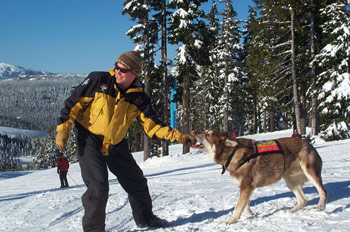Yuki is a certified avalanche rescue dog, trained to detect human scent under the snow in event of an avalanche.
Frechette began training Yuki for avalanche searches when the dog was eight weeks old. ” I wanted to train up an avalanche rescue dog,” he said. “I researched suitable breeds and decided to go with a cross-breed.” Frechette and Yuki received their full validation from CARDA last year. It was the final step in a long process, Frechette explains. “You do all the training yourself, and then you go away to a course” with members of the RCMP dog service as well as people from CARDA. After going through the course, a dog team gets in-training certification. Then after more home training they go back for the full validation.
Yuki is unique in that validated dogs are usually purebred German Shepherds. He is the first malamute cross to be validated, Frechette said. ” Malamutes, Huskies, any dog like that that people would think make a good avalanche dog, don’t,” he said. “They just like to play in the snow.” Yuki is trained to detect human scent cones in the snow. “It’s called air-scenting, as opposed to tracking,” Frechette explained. “All of us, whether we want to admit it or not, we’re all kind of like (the Peanuts character) Pigpen. Basically there’s a cloud of millions of dead skin cells and everything around us.”
When someone is wiped down a slope in an avalanche they give off a ” scent cone” that is conical, or triangular in shape.
When Frechette and Yuki go out to the site of an avalanche, they do a hasty search from downslope so Yuki can try and detect the edges of the scent cone. Then he traces back and forth within that cone until he reaches the point of origin.
“The dog is just looking for the human scent coming from the snowpack,” Frechette explained.
An avalanche rescue dog’s sense of smell is sensitive enough that he can even detect the difference between humans who have formed a probe line up the slope trying to find buried people by sticking probes in the snow, and someone who is buried.
“The first time I saw that I was blown away,” Frechette said. But it doubles the effectiveness – and swiftness – of a search if a rescue dog can go out at the same time as a probe line.
Despite the busy ski season, Frechette and Yuki find plenty of opportunity to practice searching skills. Frechette gets his fellow patrollers to wear old items of clothing for him, then he seals them in a plastic bag to be buried later in a couple of metres of snow for an exercise. “It’s got to be fun for the dog. Sometimes it’s good to challenge them on some days and just have fun on other days,” he says. While Frechette brings Yuki to the mountain when he’s on duty, Yuki is not the ski patrol’s mascot. “He’s more of a working dog than he is a pet,” Frechette explains. “When I put the harness on that dog he knows it’s work time.”
Frechette asks people to refrain from petting Yuki when he’s in his working harness, although it’s ok to talk to the dog. “What he works for is human affection when he’s in the harness – all for my praise. If people are praising the dog when he hasn’t done anything, it’s going to be pretty hard for me to get him to work.”
So far, Yuki’s sniffing services haven’t been needed at Mount Washington – no Resort guest has ever been caught in an avalanche in-bounds, Frechette said. “We haven’t had any burials. There is the potential of using (Yuki) in-bounds, but my biggest thing is all those people who are going outside our boundaries now and they don’t have a lick of avalanche equipment,” he said. “That’s where I think we’re going to be used.” Eventually, Frechette would like to see two dog teams at the resort, so there is an avalanche dog on duty every day of the week. But it was a hard enough sell to have Yuki on-site, he’ll take what he can get. ” The greatest chance of survival (in an avalanche) is getting them unburied right now. If I’m down in the valley and I get the call, it’s a bit late.”
